MercoPress. South Atlantic News Agency
Tag: Jean-Claude Trichet
-
Thursday, December 2nd 2010 - 23:05 UTC
Relief in Euro zone as ECB extends availability of emergency loans to banks
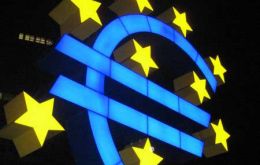
The European Central Bank moved Thursday to contain the continent's government debt crisis, extending the availability of emergency loans and keeping its benchmark lending rate at one percent.
-
Tuesday, November 23rd 2010 - 03:30 UTC
Trichet: don’t blame the Euro; it’s a solid currency in historical terms

European Central Bank President Jean-Claude Trichet Monday sought to reassure investors on the resilience of the Euro-zone as Ireland's formal request for financial assistance from the bloc sparked nervousness on European credit markets.
-
Thursday, November 4th 2010 - 20:04 UTC
Trichet does not believe the US is actively weakening the dollar by printing money
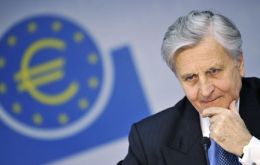
European Central Bank President Jean-Claude Trichet said on Thursday he did not think the United States was actively trying to weaken the dollar by printing money, despite criticism from emerging economic powerhouses.
-
Monday, September 13th 2010 - 04:00 UTC
Central bankers agree new rules to prevent a repeat of the financial crisis
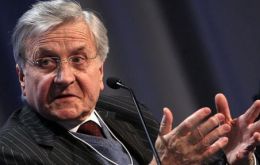
Central bank governors and senior regulators have agreed new rules designed to prevent a repeat of the recent financial crisis. At a meeting in the Swiss city of Basle, they agreed a deal requiring banks to hold more capital in reserve.
-
Friday, July 9th 2010 - 05:34 UTC
Euro zone rates unchanged; all eyes set on 23 July EU banks’ stress-tests
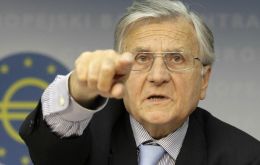
The European Central Bank left its key interest rate on hold for the fourteenth consecutive month in July as the region's banks face stress tests to ensure the stability of the financial system that is threatened by investor fears about debt.
-
Friday, May 7th 2010 - 05:36 UTC
Greek Default “Is Not an Option” and “Never Has Been” Says IMF

A default by Greece on its debt obligations is not and has never been an option, a spokeswoman for the International Monetary Fund (IMF) said on Thursday. A Greek “default is not on the table, has not been on the table” insisted IMF director of external relations Caroline Atkinson.
-
Friday, May 7th 2010 - 05:33 UTC
ECB Leaves Euro Policy Unchanged; European Leaders Set to Approve Greek Rescue
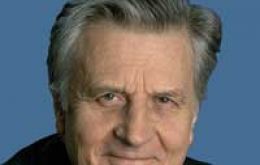
European Central Bank president Jean-Claude Trichet faced down pressure for new moves to shore up the weakest Eurozone countries, but kept options open even as he said Spain and Portugal were “not Greece”.
-
Friday, May 7th 2010 - 00:47 UTC
Greek Contagion Threatens South Europe and UK Banks Warns Rating Agency

Banks in the United Kingdom and Europe risk their credit ratings being damaged because of “contagion” from Greece's debt crisis, a ratings agency has warned. Moody's said banking systems faced “very real, common threats” if doubts were raised about their governments' abilities to pay debts. It referred specifically to UK, Irish, Italian, Portuguese and Spanish banking systems.
